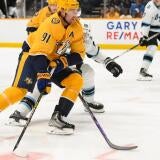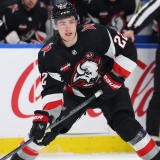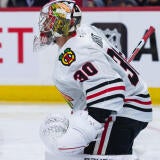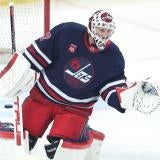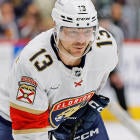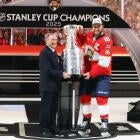NHL playoff previews: Series by series
The Fantasy season is over for most players, but the best hockey is just beginning for hard-core fans. Jan Levine previews the opening round playoff series.

This season, no Canadien teams made the playoffs, while Boston missed the postseason for second straight year. Los Angeles, the Stanley Cup winner two years ago, returns to the playoffs after missing the postseason last year. The reigning champ, Chicago, returns to aim for its fourth Cup in seven years.
Eastern Conference Quarterfinals
Washington vs. Philadelphia
Capitals
Expectations were high coming into the season for Washington after its strong offseason. After a slow-Pish start, the Capitals really hit their stride in December and never looked back, waltzing to the top seed in the East and the President's Trophy. Washington seemingly has it all. Offense galore, a solid enough defense and strong netminding led the Capitals to 120 points.
Offense: Alexander Ovechkin had a slow start for him but picked it to finish with 50 goals for the third straight season. Another ho-hum 70 point season for Nicklas Backstrom, while T.J. Oshie, an offseason acquisition, rallied to finish with 15 goals, including 11 on the PP. But Washington was propelled by the play of Evgeny Kuznetsov and Marcus Johansson, who gave Washington three top centers along with Backstrom, though Johansson can play second line left wing. Second-line right wing Justin Williams was brought in to help the Capitals get over the hurdle of a Game 7 and get past the first round. Mike Richards, the fourth-line center, gives Washington another playoff proven veteran. Jay Beagle, a solid checking-line winger, enters the playoffs a bit banged up.
Defense: John Carlson is the team's best d-man and he is healthy after missing a month late in the season with a lower-body injury. His partner, Karl Alzner, is a steady, stay-at-home defenseman. Brooks Orpik, brought in with Matt Niskanen on huge free agent contracts, missed 40 games this season with a lower-body injury, so he should be fairly well rested for the playoffs. Niskanen had 157 hits and 145 blocked shots while contributing 32 points; an overall solid year.
Goaltending: Braden Holtby tied Martin Brodeur's record with 48 wins, finishing 48-9-7 with a 2.20 goals-against average (GAA) and .922 save percentage (SV%). While Holtby has a tremendous season, he was better in 2015 than in 2016. After the calendar flipped, Holtby had a 2.50 GAA and .911 SV%, a far cry from his overall numbers, though he did rebound the final month of the season. Philipp Grubauer was a solid back up, but he won't play unless something happens to Holtby.
Flyers
Philly looked like a major long shot to make the postseason. But Shayne Gostisbehere was promoted, several injured Flyers got healthy and hot and Michal Neuvirth, then Steve Mason carried the team between the pipes to earn the eighth seed in game 81.
Offense: Claude Giroux rallied to score 67 points in 78 games while former linemate Jakub Voracek suffered through an uneven season. Wayne Simmonds is the team's best and most consistent forward, scoring 32 goals while being his usual abrasive and agitating self on the ice. Brayden Schenn had a career season playing alongside Giroux, Sean Couturier took a major step forward and Michael Raffl regressed slightly.
Defense: Gostisbehere saved the Flyers' season. After a mid-November promotion, Ghost totaled 17 goals and 29 assists in 64 games with 22 points coming on the man advantage. Mark Streit took a major step backward while the rest of the blue line, especially due to the absence of Michael Del Zotto, is OK at best.
Goaltending: Neuvirth came up big when called upon and appears to be healthy after suffering a left knee meniscus tear in March that was to sideline him for the season. Mason was stellar for about a month before the last few games of the season. Mason will start the series but if he falters, Neuvirth will replace him between the pipes.
Series notes
Washington finished second in the league to Dallas in scoring, fourth on the power play at 22.2 percent and fourth in PK at 85.0 percent. Philadelphia was 23rd in goals, 18th in PP at 18.0 percent, 22nd in PK at 80.2 percent and 13th in GAA at 2.57 allowed per game. The Flyers are playing for a higher cause following the passing of their Chairman Ed Snider on Monday.
Pick
Capitals in 6. Philly will play a physical game, but Washington is too deep and strong for the Flyers.
Pittsburgh vs. N.Y. Rangers
Penguins
Pittsburgh got off to a lousy start, resulting in the firing of coach Mike Johnston and hiring of Mike Sullivan 28 games into the season. Since that move, the Penguins averaged 3.24 goals per game, keyed by the return to form of Sidney Crosby and acquisition of Carl Hagelin. Pittsburgh closed the season 14-2 in their last 16, 33-11-5 since Dec. 21.
Offense: Crosby got off to such a slow start there were whispers that he was done. Well, so much for that. He finished with 29 points his last 20 games and 85 in 80 this season. Linemates Patric Hornqvist and Chris Kunitz also rallied after slow starts. The second line carried the Penguins. The addition of Hagelin provided speed on the other wing, giving more room to Phil Kessel, team's big offseason acquisition. Center, Evgeni Malkin, sidelined since March 13 with an injury, was replaced by Nick Bonino, who scored 15 points in 13 games down the stretch. Malkin might be back during the first round. What really helped Pittsburgh was the play of its bottom six, which brought some speed along with a solid forecheck.
Defense: It all begins and ends with Kris Letang, whose offensive brilliance overshadows his willingness to take the body and block shots. Trevor Daley, acquired for Rob Scuderi in a steal of a trade, replaced injured Olli Maatta on Letang's left and had a rebound campaign, chipping in a bit offensively while playing a steady defense. Maatta could return for the first round. Justin Schultz, acquired from Edmonton at the trade deadline, could be an X-factor this round.
Goaltending: Marc-Andre Fleury missed the last five games of the regular season with a concussion, but it looks like he will play in Game 1 on Wednesday. Matt Murray won his last six starts before being forced from Saturday's game with an injury. His status is unknown. If MAF and Murray are out, Jeff Zatkoff will start in net.
Rangers
New York got off to a tremendous start but struggled from mid-November to early-January. The Rangers righted the ship for a while before struggling again down the stretch. The main focus will be on goaltender Henrik Lundqvist, but winning and losing will be determined by the play of the blue line.
Offense: New York is led by Mats Zuccarello, who posted 26 goals and 35 assists. Linemate Derick Brassard has shown the ability raise his game in the playoffs, and J.T. Miller, the physical part of this trio, had a breakout campaign. The second line is Derek Stepan (career-high 22 goals, 33 assists), Chris Kreider (21 goals) and Rick Nash, who missed 22 games with a knee injury and posted a paltry 36 points in 60. Eric Staal was acquired at the deadline to give N.Y. a solid third-line center and playoff performer. The Rangers are better when Staal plays left wing, allowing Kevin Hayes to slot in at center, where is more comfortable.
Defense: Remember when the Rangers' defense was the envy of the league? The physical breakdowns coupled with a lack of speed and inability to cover the front of the net has made that group a shell of its former self. The team's task is even more difficult with Ryan McDonagh sidelined at least the first few games of this round with an injury. In his absence, Marc Staal has thrived with more responsibility. Keith Yandle is the team's best offensive D-man but can be prone to mistakes in his own zone. Kevin Klein's play has regressed after a strong start to the year.
Goaltending: Lundqvist posted 35 wins and a .920 SV% but had a 2.48 GAA and was pulled from eight games this year, all of which came following his brilliant start to the season. The poor own zone coverage, especially in front of the net, left Lundqvist to handle a ridiculously high percentage of in-close shots. If New York is to win, Lundqvist will have to stand on his head and then some. Antti Raanta, who rallied after a lousy start, but should only play if Lundqvist really falters.
Series Notes
Pittsburgh finished third in goals, sixth in goals against, 16th in PP success and fifth in PK. New York was seventh in goals, 15th in goals against, 14th in PP success and 26th in PK. Pitt rallied after a slow start while N.Y. was better on the PP the last third of the year, though its issues on the PK continued throughout.
Pick
Penguins in 6. My heart says Rangers, my head says Penguins, whose strong puck possession skills, couple with the Rangers' issues there, give them the edge.
Florida vs. N.Y. Islanders
Panthers
Florida's youth coalesced nicely, augmented by the ageless wonder Jaromir Jagr, to win the Atlantic Division. The Pathers rely on a quick-strike ability and strong skating to create and convert chances.
Offense: Aleksander Barkov, the second overall pick in 2013, took a major step forward this year, while Jonathan Huberdeau continued his growth. Jagr showed no signs of slowing with 27 goals and 39 assists. Jussi Jokinen and Reilly Smith flank Nick Bjugstad, who righted his game after a slow start following offseason surgery. When/if Vincent Trocheck, who will miss at least part of the series with an ankle injury, returns, Florida will have an impressive 1-3 down the middle. Jiri Hudler has become a solid third-liner since arriving with Teddy Purcell at the deadline. The bottom three are nothing special, though they would get a boost if Dave Bolland, out since February with an injury, returns.
Defense: Aaron Ekblad might have been even better this year after winning the Calder last season. He is paired with veteran Brian Campbell on the top duo. Willie Mitchell is still out, which hurts the Cats' depth pushing others into more prominent roles. Dimitry Kulikov, Jakub Kindl, Erik Gudbranson and Steve Kampfer round out the top six. Kampfer is dealing with a foot injury, so Mike Matheson could opt in.
Goaltender: Roberto Luongo' ancillary numbers are almost a mirror image of 2015, but he won 35 games rather than 28 while playing one more game. Those wins are thanks to the offense in front of him. Al Montoya was one of the league's better backups, going 12-7-3 with a 2.18 GAA and .919 SV%. If Florida needs to call on him, there won't be an immense drop off.
Islanders
The Islanders had a shot at the third seed of the Metro but opted to sit many of their veterans Sunday against the Flyers and fell 5-2 to end up facing the preferred opponent, the Panthers. The Islanders are a workmanlike team, wearing down opponents.
Offense: John Tavares didn't have his usual stellar season but rallied late to score 33 goals and 37 assists. Kyle Okposo provided 22 goals and 42 assists moving between the first three lines. Frans Nielsen can play center and wing and is a stalwart on the penalty kill, which at times overshadows his offensive production. The key might be how Brock Nelson, Ryan Strome and Josh Bailey supplement the big three, especially with Anders Lee out for the playoffs with a fractured fibula. New York's big advantage over most teams is its fourth line (Matt Martin-Casey Cizikas-Cal Clutterbuck), which provides energy and physical play while forechecking the heck out of opponents. Mikhail Grabovski is uncertain for the series because of a concussion.
Defense: Travis Hamonic suffered a knee injury March 31, but it looks like he might be ready for Game 1 on Thursday. If so, he likely pairs with Calvin de Haan while Johnny Boychuk, who had 35 points a year ago and 25 this year, is matched with Nick Leddy, who improved to 40 points this season. The third pair might be Thomas Hickey and Marek Zidlicky with Brian Strait, Adam Pelech and Ryan Pulock possibly in the mix.
Goaltending: Who plays net? Will Jaroslav Halak's March 8 groin injury, expected to keep him out 6-8 weeks, be healed enough for him to play? Even if so, as Halak was 18-13-4 with a 2.30 GAA and .919 SV%, do the Islanders' turn to Thomas Greiss, who finished 23-11-4 with a 2.36 GAA and .925 SV%? Jean-Francois Berube has his own injury, which might make Christopher Gibson the backup to Greiss if Halak can't go.
Series Notes
One area the Isles have the advantage is special teams. Florida was just 23rd in PP success at 16.9 percent, while the Isles were second in PK success at 85.5 percent. On the other end, New York was 13th in PP success at 18.7 percent, while Panthers were 24th in PK success at 79.5 percent.
Pick
Panthers in 6. The Isles wanted Florida rather than Pittsburgh. Despite getting their wish, they will bow out in the first round as Florida's youth continues to excel.
Tampa Bay vs. Detroit
Lightning
In a playoff matchup from last season, the Lightning and Red Wings meet again. Unlike last year, Tampa Bay enters the playoffs with several key players injured. Steven Stamkos is out with a blood clot in his right arm. His absence is a huge blow to a Lightning team that finished 13th in scoring. Center Tyler Johnson was injured Saturday, and if he joins Stamkos on the sideline, it could prove too much for the Lightning to overcome. Defenseman Anton Stralman is also unlikely to play this round thanks to a fractured left fibula.
Offense: Desperate times call for desperate measures. With Stamkos out and the Lightning struggling, GM Steve Yzerman called up Jonathan Drouin, who had been persona non grata in Tampa Bay. Drouin will be in the top-six in the playoffs. In Stamkos' absence, even more reliance will be placed on Nikita Kucherov (30 goals, 36 assists) and Ondrej Palat, who rebounded after a horrible start. Alex Killorn and Valtteri Filppula will need to pick up their games to make up for Stamkos and Johnson. More responsibility will also be heaped upon Vladislav Namestnikov and Ryan Callahan, who had a hugely disappointing year.
Defense: The absence of Stralman creates a huge hole for Tampa. With Stralman out, Victor Hedman's return from an injury comes at a perfect time. Look for him to play close to 30 minutes a game. Stralman's injury opened the door for Matt Carle to move up to the top pairing. Jason Garrison and Andrej Sustr will need to up their games, as will Braydon Coburn and Nikita Nesterov.
Goaltending: Between the pipes is where Tampa Bay might have the biggest edge and where the Lightning might win the series. Ben Bishop was brilliant this season, going 35-21-6 with a 2.06 GAA and .926 SV%. Andrei Vasilevskiy has a bright future, but he was up and down. The Lightning finished fifth in the NHL in goals-against, driven largely by Bishop.
Red Wings
Detroit rallied late to eke out the seventh playoff spot and earn its 25th consecutive playoff berth, continuing a remarkable stretch. The real story might be the possibility that it's Pavel Datsyuk's last hurrah as he heads to the KHL.
Offense: Datsyuk, a first-ballot Hall of Famer, and Henrik Zetterberg are not the weapons they once were but each can raise his game in the postseason. Justin Abdelkader had another solid year, while rookie Dylan Larkin finished with 23 goals and 22 assists. Tomas Tatar posted a 21-24 season and Gustav Nyquist regressed a bit. The remainder of the Red Wings' top 12 have some recognizable names like Brad Richards, whose production fell but who can step up in the playoffs, and Darren Helm. Keep Andreas Athanasiou in mind in your playoff pools, as he might be a critical component of Detroit's offense.
Defense: Nothing stands out on the Red Wings' blue line, though Mike Green provides offense from the backline with 35 points, including 20 on the man advantage. Niklas Kronwall regressed a bit, struggling in his own zone and with injuries, while Danny DeKeyser hasn't developed offensively as hoped but was pretty good in his own end. Kyle Quincey and Brandon Smith round out the blue line with Alexei Marchenko the extra.
Goaltending: Jimmy Howard will be between the pipes for Game 1 after wresting the job from Petr Mrazek, who struggled down the stretch. Howard went 14-14-5 with a 2.80 GAA and .906 SV%, which shows you just how bad Mrazek has been.
Series Notes
Without Stamkos and maybe Johnson, a Lightning power play that finished 28th in success rate and fails to draw man-advantages could struggle even more, even though Detroit was 14th in PK success at 81.5 percent. The absence of Stralman hurts the penalty kill, which ended the year seventh in the league with an 84-percent success rate, against Detroit, who succeeded 18.8 percent of the time on the PP, 12th.
Pick
Lightning in 7. A month or so ago, the prediction would have been a Lightning sweep. Now, due to injuries, the gap has narrowed substantially. However, Bishop gives Tampa the slight edge over Detroit.
Western Conference Quarterfinals
Anaheim vs. Nashville
Ducks
The Ducks had to wait until game 82 to win the Pacific Division. The Ducks won the Jennings trophy for fewest goals allowed to offset a 17th-place finish in goals scored. In addition, Anaheim had the best power play and penalty kill in the league.
Offense: The dynamic duo of Ryan Getzlaf and Corey Perry, after a rough start for each, carried the Ducks, with both rallying late, especially Perry. Jamie McGinn was a sage deadline acquisition and is now the top-line left winger. Ryan Kesler rebounded his second year in Anaheim and his physical play is a great complement to Getzlaf. Like many Ducks, Jakob Silfverberg picked up his offense in March while also providing his usual stellar defense. David Perron is out 2-4 more weeks with a separated right shoulder, creating a hole on the second line. Rickard Rakell could fill that but might center the third line with Brandon Pirri, another deadline acquisition, returning from injury to play wing on the second line.
Defense: Anaheim possesses mobile D-men in Sami Vatanen, Cam Fowler and Hampus Lindholm. Josh Manson is paired with Lindholm and gives the Ducks a physical presence. As does Kevin Bieksa, who will play on the second or third pairing. Simon Despres is likely the sixth D-man and is another stay at-home D-man.
Goaltending: Anaheim has two goalies who could each be No. 1. John Gibson went 21-13-4 with a 2.07 GAA and .920 SV%. Frederik Andersen, who returned from a concussion to post a shutout Sunday, went 8-1-1 in his last 10. Coach Bruce Boudreau has yet to name a starter, but expect Andersen to get the first chance with Gibson in the wings.
Predators
Nashville is built from the back line out but took off when Ryan Johansen replaced Seth Jones, adding needed offense. The Predators finished 10th on the PP and 16th on the PK, which is where Anaheim has an edge.
Offense: Nashville needed a top-line center in the worst way and paid a heavy price to acquire Johansen, who lengthened the lineup and added 34 points in 42 games as a Predator. James Neal benefited from playing alongside Johansen, while Calle Jarnkrok moved from center to wing and totaled 16 of his 30 points the final 31 games. Nashville can load up the top line, moving Filip Forsberg, who scored 23 points on the man advantage. Craig Smith saw his scoring drop the second straight year, while Mike Ribeiro had 43 assists. Then the issues begin as the bottom-six is middling at best.
Defense: Roman Josi continued his rise to elite status, posting 61 points, including 24 on the PP, while blocking 185 shots. It shows how good Josi is that he gets first billing over Shea Weber, who tallied 51 points, had 169 hits and 160 blocked shots while finishing with a positive Corsi. Mattias Ekholm and Ryan Ellis get a little lost in the shuffle but had strong years. Barret Jackman, Petter Granberg and Barret Jackman rotate among the last two spots.
Goaltending: After a rebound season last year, Pekka Rinne has struggled again. He went 34-21-10 but saw his GAA rise to 2.48 and SV% fall to .908, alternating good and bad streaks. Carter Hutton is the backup.
Series Notes
Defensively, this should be a fun matchup as both teams excel at defending the net. Nashville, like Anaheim, is one of the top possession teams in the league, but the Ducks have the advantage on the power play.
Pick
Ducks in 5. This looks to be Anaheim's year, as they look to make it back to the Cup Finals for the first time since 2007 when they won the title.
San Jose vs. Los Angeles
Sharks
San Jose returns to the playoffs after missing last year's tournament. The Sharks' change from Todd McLellan to Peter DeBoer and offseason acquisition of Martin Jones paid immediate dividends. Jones won 37 games, solidifying the goaltending spot. San Jose also boasts enviable depth down the middle.
Offense: Joe Thornton had another brilliant campaign, turning back the clock with 19 goals, his highest since 2010-11, and 63 assists. Logan Couture was limited to 52 games due to injuries, but scored seven points his last seven games. Patrick Marleau rebounded to score 25 goals, though he had an unsightly -22 rating. Tomas Hertl the turtle improved after his poor sophomore campaign, linemate Joe Pavelski just excels annually and Joel Ward totaled 21 goals despite regressing after a hot start. Joonas Donskol provides skill on the second line. The bottom six, other than Marleau, is nothing special, with Tommy Wingels and Melker Karlsson the best of the lot.
Defense: Brent Burns is like another forward on defense. He finished the season with 27 goals and 48 assists. Paul Martin provides the stay-at-home partner, allowing Burns to rush up ice. Marc-Edouard Vlasic and Justin Braun make up a solid second pair, with the pickle adding 39 points. The third pair of Brendan Dillon and Roman Polak provide physical play from the blue line, as each like to hit and often.
Goaltending: Jones was excellent between the pipes, posting six shutouts, but his 2.27 GAA and .918 SV% were OK, not great. San Jose acquired James Reimer at the deadline, and he was nothing short of brilliant. Jones should be between the pipes each playoff game but if he falters, DeBoer could turn to Reimer.
Kings
Los Angeles, which also missed the playoffs last year, is a heavy team on the pick and brings a cup-winning pedigree, having won it just two years ago. The Kings also can match San Jose down the middle.
Offense: Anze Kopitar, who really took off when he signed his long-term contract, is monster possession wise and raises his game in the playoffs. Jeff Carter matched his production of a year ago as he got hot down the stretch. The hope for Vincent Lecavalier is that the playoffs will kickstart his engine. Milan Lucic, acquired at the draft, had a strong season despite going 11 games without a goal in March into April. Tyler Toffoli continued his growth, making up for the absence of Marian Gaborik, whose status for the playoffs is unclear due to a Feb. 12 knee injury. Tanner Pearson chipped in 15 goals while Dustin Brown's regression continued this year. Keep an eye on Kris Versteeg, who brings playoff experience and could slot onto the second line.
Defense: Drew Doughty, up for Norris consideration again, is another possession monster whose numbers (14 goals, 37 assists, 125 hits, 105 blocked shots) don't do his game justice. He is paired with Brayden McNabb, who is a solid stay-at-home D-man. Jake Muzzin, the counterpart to Doughty, is usually paired with Alec Martinez, who plays a similar game to Muzzin, but he missed the last four games with an injury. In his absence, Luke Schenn moved from the third to second pair. Rob Scuderi and Jamie McBain has been the third pair, with one to sit if Martinez is healthy.
Goaltending: Jonathan Quick had another Quick-like campaign. He played 72 games, posting a .918 SV%, slightly better than a year ago, but saw his GAA rise from 2.07 to 2.24 while winning 36. He has shown he can take his game to another level come playoff time. Jhonas Enroth did a nice job as the backup.
Series Notes
Given their ages, this could be the last kick at the can for Thornton and Marleau. Both teams have a markedly better power play than penalty kill. To beat L.A., San Jose needs to stay out of the box and be prepared to play low-scoring, 1-0, 2-1 games. The Sharks went just 18-20-3 at home but led the league with 28 road wins. They will need to go home 1-1 to have a shot to win.
Pick
Sharks in 7. San Jose will have just enough firepower for the series win.
Dallas vs. Minnesota
Stars
The Stars surprisingly earned the top seed in the West. Despite losing Tyler Seguin down the stretch to an Achilles' tendon injury and struggling between the pipes earlier in the season, Dallas earned its first division title since 2005-06 and first No. 1 seed since 2002-03. Seguin could return for the first round, as he was expected to miss 3-4 weeks when he was injured March 17.
Offense: Jamie Benn once again had a huge season, tallying 41 goals buffeted by Jason Spezza, who stepped up with Seguin out. Cody Eakin regressed a bit, failing to score the last eight games of the season. Patrick Sharp's year was a bit uneven with just four goals after the All-Star break. The remainder of the forwards is nothing special, though Ales Hemsky, Colton Sceviour and Valeri Nichushkin all had their moments. Dallas relies on strong puck possession, as the team was second in the league in score-adjusted Corsi, and offense from defenseman John Klingberg, who had 58 points this season, and Alex Goligoski, who had 37 points.
Defense: The Stars improved their blue line at the deadline, obtaining Kris Russell, mainly for his ability to block shots. He had 210, 36 in 11 games with Dallas. Klingberg and almost all the Dallas D finished in plus Corsi territory, even though on the face of it they aren't a great blue line. Johnny Oduya continues to be a steadying influence while Jason Demers should be back from his shoulder injury for the playoffs.
Goaltending: Antti Niemi and Kari Lehtonen each had so-so years. Both won 25 games, but Niemi had a 2.67 GAA and .905 SV% while Lehtonen went 2.76/.906. The result: Dallas's 2.78 goals allowed per game leads playoff teams. Lehtonen, due to his season-ending hot streak, should open the playoffs, even though Niemi has a ring with Chicago. Lehtonen picked up nine wins in his last 13 appearances (2.15 GAA).
Wild
Minnesota lost its last five games but earned a playoff berth due to Colorado slumping even more. The Wild's top-nine on paper might be even better than Stars', but Minnesota struggles on special teams.
Offense: Zach Parise missed 12 games with assorted injuries, including the regular-season finale, which makes him uncertain for the first playoff game. Charlie Coyle stepped up his game this year but went scoreless the last seven games of the season. Mikko Koivu led the Wild with 56 points, his highest production since 2010-11. Third-line center Mikael Granlund had career highs in both goals (13) and points (44). Erik Haula and Nino Niederreiter were key producers whose output made up somewhat for the slumps of Thomas Vanek, who might miss the first round with an injury, and Jason Pominville.
Defense:Minute-muncher Ryan Suter rebounded from a subpar 2014-15. His linemate, Jared Spurgeon chipped in 11 goals and 18 assists while blocking 157 shots. Mathew Dumba took a step up this season, though he had just two points his last 12 games. Marco Scandella, Jonas Brodin and Nate Prosser round out the rest of the defensive core.
Goaltending: Devan Dubnyk wasn't quite as good as he was last year, but he helped carry the Wild to the playoffs by going 10-2-1 in March. While he lost all four April starts, Dubnyk still posted a solid 2.33 GAA and .918 SV%.
Series Notes
Dallas is driven by its offense, which led the league in goals per game at 3.23 per and finished fifth in PPG per game at 22.1 percent despite not having Seguin the last 10 games of the season. The Stars were 10th at 82.3 percent shorthanded, completing their special-teams advantage. Minnesota finished 15th in the league at 18.5 percent on the man advantage and 27th at a 77.9-percent success rate on the penalty kill.
Pick
Stars in 6. It's the special teams coupled with the return of Seguin that carry Dallas past Minnesota.
St. Louis vs. Chicago
Blues
The Blues went 8-2 down the stretch and just missed getting the No. 1 seed out west. They are loaded up front, have a solid blue line and two capable goalies.
Offense: Vladimir Tarasenko had a career-high 40 goals and 74 points. Alexander Steen, Paul Stastny and Jaden Schwartz, each of whom missed time to injury, are healthy. Rookie Robby Fabbri stepped up while teammates were injured. St. Louis acquired Troy Brouwer this offseason to provide playoff experience and size to go alongside David Backes. Jori Lehtera had a rough sophomore campaign. He and Patrik Berglund enter the playoffs as question marks up front. Dmitrij Jaskin is another one to watch as a possible playoff sleeper.
Defense: While each of the top four didn't have their best seasons, collectively they give the Blues a strong base. Kevin Shattenkirk had a minus-14 rating but had nearly 200 combined hits and blocked shots. Alex Pietrangelo saw his production drop for the second straight season but finished with a five-game point streak and plays more than 26 minutes a game. Jay Bouwmeester has become a solid, stay-at-home mobile defenseman who can push the puck up ice while also defending nicely in his own zone. Rookie Colton Parayko burst onto the scene with an impressive 33 points, a plus-28 rating, 102 hits and 122 blocked shots. Joel Edmundson, a physical blue-liner and Carl Gunnarsson round out the top six.
Goaltending: Usually, having two goalies is like having none, but in the Blues' case, it worked. Injuries cost both Brian Elliott and Jake Allen time. Elliott may have wrested the No. 1 job from Allen, though he wasn't particularly good in two of his last four starts. Allen missed the latter part of the regular season with an injury and Anders Nilsson finished the year as the backup.
Blackhawks
Chicago rode Patrick Kane, Artemi Panarin and Corey Crawford to third place in the Central Division. The Blackhawks went 5-2-3 down the stretch, losing their last two games in overtime. In the past, the blue line was a major reason for the Blackhawks' success. This year, with what's been called 3.5 defensemen, it has struggled at times.
Offense: Kane led the league with 106 points on 46 goals and 60 assists, starting hot and never letting up. Panarin, who came over from SKA in the KHL, was the Robin to Kane's Batman, posting 30 goals and 47 assists. Center Artem Anisimov nursed an upper-body injury as the season ended. Jonathan Toews had, for him, a disappointing year, but he earns his money as a leader in the playoffs. Chicago added some depth and firepower by bringing back Andrew Ladd for a hefty price at the deadline. Ladd skates alongside Toews and Marian Hossa, the latter of which was limited to 64 games and 33 points. Andrew Shaw, who does his best work in the playoffs, skates with Tomas Fleischmann, another deadline acquisition, and Teuvo Teravainen, another playoff hero a year ago.
Defense: Brent Seabrook finished with career-highs of 14 goals and 35 assists. Duncan Keith will miss Game 1 as he finishes his six-game suspension for a high-sticking incident. Keith, who plays 25:34 a game, should see even more minutes in the postseason. Niklas Hjalmarsson had another solid campaign, serving as the third D-man. Now it gets dicey. The Johnny Oduya trade made Michal Rozsival the fourth D-man, though Trevor van Riemsdyk might have surpassed him. Christian Ehrhoff and Erik Gustafsson should play the first game with Ehrhoff the sixth D-man.
Goaltending: Crawford carried the Blackhawks this season, finishing with a 2.37 GAA, .924 save percentage and 35 wins despite missing four weeks with an injury. He returned Saturday, which means he will be between the pipes for Game 1. Backup Scott Darling saw some playoff action last year and played 29 games this year but had a 2.58 GAA.
Series Notes
St. Louis is in the top 10 of score-adjusted Corsi and on special teams, finishing sixth in PP% at 21.5 and third in PK% at 85.1. Chicago is middle of the pack in puck possession, but second in PP% at 22.5 and 21st in PK% at 80.3%.
Pick
Blues in 6. All of the hard playoff minutes -- three titles in six years -- will finally catch up to the Blackhawks. In addition, the Blues will expose Chicago's lack of solid depth on the blue line as they finally get past the Blackhawks.
